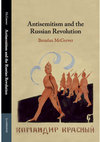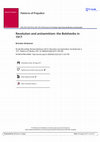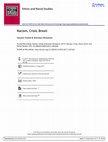Monographs by Brendan McGeever

When the Bolsheviks came to power in 1917, they announced the overthrow of a world scarred by exp... more When the Bolsheviks came to power in 1917, they announced the overthrow of a world scarred by exploitation and domination. In the very moment of revolution, these sentiments were put to the test as antisemitic pogroms swept the former Pale of Settlement. The pogroms posed fundamental questions of the Bolshevik project, revealing the depth of antisemitism within sections of the working class, peasantry and the Red Army. Antisemitism and the Russian Revolution offers the first book-length analysis of the Bolshevik response to antisemitism. Contrary to existing understandings, it reveals this campaign to have been led not by the Party leadership, as is often assumed, but by a loosely connected group of radicals who mobilized around a Jewish political subjectivity. By examining pogroms committed by the Red Army, Brendan McGeever also uncovers the explosive overlap between revolutionary politics and antisemitism, and the capacity for class to become racialized in a moment of crisis.
Journal Articles by Brendan McGeever

The Political Quarterly, 2020
In this article, we argue that Labour's antisemitism crisis has been misunderstood. We suggest th... more In this article, we argue that Labour's antisemitism crisis has been misunderstood. We suggest that a more accurate and sophisticated understanding of antisemitism offers a way forward. There are three elements to this claim. First, by drawing on existing data on attitudes towards Jews, we criticise the widespread focus on individual 'antisemites', rather than on the broader problem of antisemitism. In turn, we conceive of antisemitism not as a virus or poison, as in so many formulations, but rather, as a reservoir of readily available images and ideas that subsist in our political culture. Second, following on from this understanding, we offer five ways forward. Finally, we set this analysis in the context of a historical parting of the ways between anti-racism and opposition to antisemitism. An anti-racism defined solely by conceptions of whiteness and power, we argue, has proven unable to fully acknowledge and account for anti-Jewish racism.

QUEST: ISSUES IN CONTEMPORARY JEWISH HISTORY , 2019
When the Bolsheviks came to power in 1917, they announced the overthrow of a world scarred by exp... more When the Bolsheviks came to power in 1917, they announced the overthrow of a world scarred by exploitation and domination. In the very moment of revolution, these sentiments were put to the test as antisemitic pogroms swept across the former Pale of Jewish Settlement. The pogroms reached a devastating peak in the year 1919, marking the most violent chapter in pre-Holocaust modern Jewish history. A century of scholarship has conclusively shown that most of the atrocities were perpetrated by forces hostile to the Revolution. But antisemitism was not the preserve of the counterrevolution: it manifested across the political divide, finding traction among the revolutionary left, as well. This article examines the nature and extent of antisemitism in the Red Army and more generally the Bolshevik movement in Ukraine in the spring and summer of 1919. In bringing together internal Bolshevik security reports, memoirs, newspapers, and Party and governmental communications, the article shows that revolution and antisemitism could be overlapping as well as competing worldviews. It does so by offering an analytical framing of Red Army antisemitism: drawing on works in Critical Theory, it brings into view the importance of class relations, and uncovers the complex ways in which antisemitism could find expression in revolutionary politics.

Patterns of Prejudice, 2017
McGeever's essay offers an analysis of the Bolshevik encounter with antisemitism in 1917. Antisem... more McGeever's essay offers an analysis of the Bolshevik encounter with antisemitism in 1917. Antisemitism was the dominant modality of racialized Othering in late imperial Russia. Yet 1917 transformed Jewish life, setting in motion a sudden and intense period of emancipation. In Russian society more generally, the dramatic escalation of working-class mobilization resulted not only in the toppling of the Tsar in February, but the coming to power of the Bolsheviks just eight months later. Running alongside these revolutionary transformations, however, was the re-emergence of anti-Jewish violence and the returning spectre of pogroms. Russia in 1917, then, presents an excellent case study for exploring how a socialist movement responded to rising antisemitism in a moment of political crisis and escalating class conflict. His article does two things. First, it charts how the Bolsheviks understood antisemitism, and how they responded to it during Russia's year of revolution. In doing so, it finds that Bolsheviks participated in a wide-ranging set of campaigns organized by the socialist left, the hub of which was composed of the soviets of workers' and soldiers' deputies. Second, the essay argues that antisemitism traversed the political divide in revolutionary Russia, finding traction across all social groups and political projects. As the political crisis deepened in the course of 1917, the Bolsheviks increasingly had to contend with the antisemitism within the movement. In traditional Marxist accounts, racism and radicalism are often framed in contestation. McGeever's article, however, offers a more complex picture in which antisemitism and revolutionary politics could be overlapping, as well as competing world views.

Ethnic and Racial Studies, 2017
This article offers a conjunctural analysis of the financial and political crisis within which Br... more This article offers a conjunctural analysis of the financial and political crisis within which Brexit occurred with a specific attentiveness to race and racism. Brexit and its aftermath have been overdetermined by racism, including racist violence. We suggest that the Leave campaign secured its victory by bringing together two contradictory but inter-locking visions. The first comprises an imperial longing to restore Britain’s place in the world as primus inter pares that occludes any coming to terms with the corrosive legacies of colonial conquest and racist subjugation. The second takes the form of an insular, Powellite narrative of island retreat from a “globalizing” world, one that is no longer recognizably “British”. Further, the article argues that an invisible driver of the Brexit vote and its racist aftermath has been a politicization of Englishness. We conclude by outlining some resources of hope that could potentially help to negotiate the current emergency.
Patterns of Prejudice , 2017
Chapters in Edited Collections by Brendan McGeever

Russia's Great War and Revolution: The Centennial Reappraisal: Russia's Home Front 1914-22, the Experience of War and Revolution, vol. 2. , 2018
"This chapter presents a textual analysis of Bolshevik and Soviet Government campaigns against po... more "This chapter presents a textual analysis of Bolshevik and Soviet Government campaigns against pogroms and antisemitism between 1918 and 1919. The Civil War pogroms posed fundamental questions of Marxist theory and practice, particularly since they revealed the nature and extent of working class and peasant attachment to antisemitism and nationalism. Indeed what was perhaps most shocking to Bolshevik leaders was the extent to which antisemitism and pogromist violence had come to articulate with the revolutionary process: whilst the main portion of the 1919 pogroms was carried out by the White Army, during the spring and early summer of 1919 a fundamental source of antisemitism emanated from local Soviet state apparatuses and various units of the Red Army in Ukraine . In other words, and to put this in Gramscian terms, the Soviet confrontation with antisemitism was one which required not only a ‘war of manoeuvre’ against the forces of ‘counterrevolution’, but, above all, a ‘war of position’, that is to say, an ideological struggle against the antisemitism of its own cadres.
The primary aim of the chapter is to try to map out some of the theoretical underpinnings of Party and governmental responses to this wave antisemitism. More specifically, it sets out to explore Party assumptions about the spatial, temporal and agential dynamics of antisemitism and pogromist violence during this crucial and formative period. "
Antisemitism was found across the political divide in Russia’s year of revolution.
The Irish Easter Rising of 1916 reached a global audience. As this paper reveals, its impact was ... more The Irish Easter Rising of 1916 reached a global audience. As this paper reveals, its impact was particularly felt in the Soviet Union.
Book Reviews by Brendan McGeever
Selected Conference Papers by Brendan McGeever











Uploads
Monographs by Brendan McGeever
Journal Articles by Brendan McGeever
Chapters in Edited Collections by Brendan McGeever
The primary aim of the chapter is to try to map out some of the theoretical underpinnings of Party and governmental responses to this wave antisemitism. More specifically, it sets out to explore Party assumptions about the spatial, temporal and agential dynamics of antisemitism and pogromist violence during this crucial and formative period. "
Commentary by Brendan McGeever
http://www.newleftproject.org/index.php/site/article_comments/nationalism_and_anti_racist_strategy_after_the_2015_general_election
Book Reviews by Brendan McGeever
Selected Conference Papers by Brendan McGeever
The primary aim of the chapter is to try to map out some of the theoretical underpinnings of Party and governmental responses to this wave antisemitism. More specifically, it sets out to explore Party assumptions about the spatial, temporal and agential dynamics of antisemitism and pogromist violence during this crucial and formative period. "
http://www.newleftproject.org/index.php/site/article_comments/nationalism_and_anti_racist_strategy_after_the_2015_general_election
November 10, 2016 -- London
With Peter Thomas, Craig Brandist, Brendan McGeever and Örsan Senalp